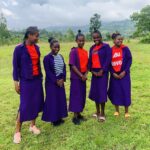Ethiopia (Wolaita Zone), 2017-2024, Girls’ Education Challenge; UKAid
STAGES (Supporting the Transition of Adolescent Girls Through Enhancing Systems) with funding from UKAid Girls’ Education Challenge breaks down the barriers to education for girls in rural Ethiopia, with a particular focus on the most disadvantaged. We are tackling a critical shortage of access to secondary education, social barriers that prioritise boys’ education over their female peers, and multiple factors that lead girls to miss school days or drop out early.
Key facts
Results so far
- Girls’ numeracy scores improved by almost 20% at the project mid-point
- Increased resilience and confidence for learning and transition with a 23% increase in self-esteem for girls
- Improved transition, and intention to complete secondary education: 90% of girls want to continue to senior secondary school
- 97% of teachers reported improvements in lesson planning, using teaching aids and assessing students learning
- Through scale-up of project interventions by zonal government, an additional 456 schools, 12,182 teachers, and 460,070 learners have been reached
All information from external evaluation in 2021 and 2022. More highlights from these reports can be found here.
My biggest concern was who will help me when I entered secondary school, but the organization has started assisting me. Because of this, not only me but also my parents are happy and confident to continue my education.
Girl studentKey activities
- Strengthening school leadership for girls’ education through professional development of school leaders and local government staff and inclusive data collection and analysis
- Improving teaching quality by strengthening CPD on inclusive, child-centred pedagogy, improving teachers’ foundational literacy and numeracy, and building capacity to provide remedial support
- Engaging the community to better support schools through management structures, Mother and Father Groups and gender clubs
- Direct, material support to girls including Social and Emotional Learning (SEL) provision, learning materials, bursaries and sanitary protection
- Opening up access to secondary education through the construction of four new secondary schools, upgrading school toilets and creating safe spaces for girls during menstruation via sanitation rooms

